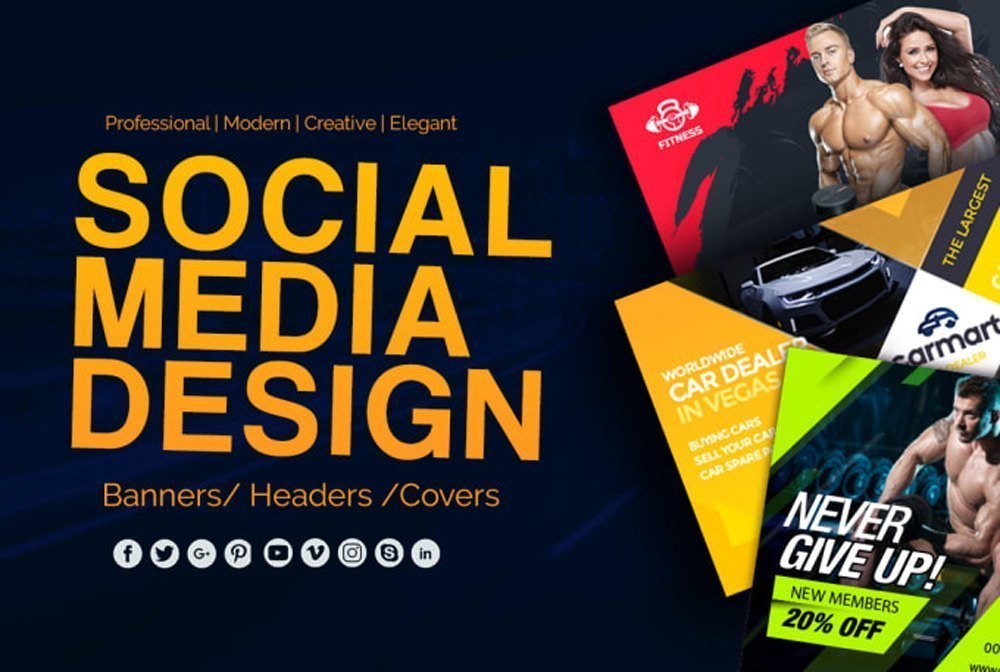
Social Media Ads Design
Crafting the Perfect Ad for Engagement and Conversion
Social Media Ads Design are a powerful tool for organizations to reach and draw in with their interest group. With many clients consistently looking at stages like Facebook, Instagram, and Twitter, the potential for permeability is tremendous. In any case, how would you ensure your promotions hang out in an ocean of content? Let’s jump into the fundamental parts of a virtual entertainment promotion plan and determine how to make advertisements that catch consideration and drive transformations.
Understanding Your Audience
Knowing your audience is crucial for effective social media ads. Portray your primary vested party by perceiving their economics, interests, and online approaches to acting. Research their inclinations to tailor your promotion plan appropriately. Understanding your crowd guarantees your advertisements resound, driving higher commitment and improved results.

Defining Your Target Audience
Before you even consider designing an ad, you should realize who you’re planning it for. Who is your optimal client? What are their inclinations, socioeconomics, and online ways of behaving? Characterizing your leading interest group is the most vital phase in making a promotion that impacts them.
Researching Audience Preferences
Once you have a clear picture of your target audience, now is the right time to plunge further. What sort of happiness do they draw in with the most? Are they inclined toward recordings, pictures, or text-based posts? Utilize this data to direct your promotion plan decisions.
Setting Clear Objectives
Setting clear objectives is essential for successful social media ads. Distinguish your mission objectives, whether it’s rising image mindfulness, creating leads, or driving deals. Adjust your promotion plan with these goals to make engaged and compelling advertisements that accomplish your ideal results and expand your profit from the venture.
Identifying Campaign Goals
Every successful ad campaign starts with clear objectives. Are you intending to increase mark mindfulness, produce leads, or drive deals? Distinguishing your mission objectives will assist you with making an engaging and viable promotion plan.
Aligning Design with Objectives
Your ad’s design should align with your objectives. For instance, if you want to drive deals, your promotion ought to incorporate areas of strength for a to-activity and feature the advantages of your item or administration.
Choosing the Right Platform
Facebook Ads
Facebook is a versatile platform that offers a variety of ad formats, from picture and video promotions to merry-go-round and slideshow advertisements. Each configuration has its own assets, so pick the one that best accommodates your mission objectives.
Instagram Ads
Instagram is all about visuals. Fabulous pictures and drawings in recordings perform uncommonly well on this stage. Ensure your promotion configuration is outwardly engaging and fits consistently into clients’ feeds.
Twitter Ads
Twitter’s fast-paced environment requires compact and direct ads. To get consideration, utilize strong visuals and infectious titles.
LinkedIn Ads
LinkedIn is ideal for B2B marketing. Proficient and enlightening promotion plans work best here. Center around displaying your mastery and industry information.
Critical Elements of a Social Media Ad
Eye-Catching Visuals
Visuals are the first thing users notice. Utilize top-notch pictures or recordings that stand out and draw consideration.
Compelling Headlines
Your headline should grab attention and make users want to learn more. Keep it short, fascinating, and pertinent to your crowd.
Persuasive Copy
Your ad copy should be clear, brief, and influential. Address your audience’s problem areas and highlight the advantages of your item or administration.
Design Principles for Social Media Ads
Simplicity and Clarity
Keep your ad design simple. Avoid mess and focus on conveying a single, clear message.
Consistent Branding
Your ads should reflect your brand’s identity. Utilize steady tones, text styles, and symbolism to assemble memorability.
Effective Use of Color
Colors can evoke emotions and influence perceptions. Pick colours that align with your image and reverberate with your crowd.
Creating Engaging Visuals
High-Quality Images
Use high-resolution images that look professional and appealing. Low-quality pictures can make your promotion look amateurish and drive clients away.
Use of Video Content
Videos are incredibly engaging and can convey a ton of data in a short measure of time. Use recordings to exhibit your item, recount a story, or give an instructional exercise.
Incorporating Graphics and Icons
Graphics and icons can break up text and add visual interest to your advertisements. Use them sparingly to improve your message without overpowering your crowd.
Crafting Compelling Headlines
Attention-Grabbing Techniques
Use powerful words, questions, questions, or explanations to snatch consideration. Your title ought to make clients quit looking over and pay heed.
Incorporating Keywords
Include relevant keywords in your headlines to improve your ad’s visibility, permeability, and significance.
Testing Different Headlines
Take your time with the first headline you come up with. Test various titles to see which one performs best.
Writing Persuasive Copy
Addressing Pain Points
Identify your audience’s pain points and address them straightforwardly in your copy. Show how your product or organization can address their interests.
Highlighting Benefits
Focus on your product or service’s benefits rather than its features. Make sense of how it can benefit your clients’ lives.
Clear Call to Action
Your source of inspiration (CTA) should be clear and compelling. Tell clients precisely what you keep up with that they ought to do, whether it’s clicking an association, chasing after a notice, or making a purchase.
Utilizing Ad Formats Effectively
Image Ads
Image ads are straightforward and can be very effective when done right. Utilize excellent pictures and a reasonable CTA.
Video Ads
Video ads are highly engaging and can effectively deliver your message message. Keep them short and direct.
Carousel Ads
Carousel ads allow you to showcase multiple images or recordings in a solitary advertisement. Utilize this configuration to feature various highlights of your item or recount a story.
Story Ads
Story ads appear in the Stories section of platforms like Instagram and Facebook. They are full-screen, vivid, and can very lock-in.
Optimizing for Mobile
Mobile-Friendly Design
More than half of social media users access platforms on their mobile devices. Ensure your promotion configuration is dynamic and looks great on little screens.

Importance of Responsive Layouts
A responsive layout ensures your ad looks great on any device, whether a telephone, tablet, or work area.
A/B Testing Your Ads
Importance of Testing
A/B testing allows you to look at changed variants of your progression and see which one performs better. This can assist you with streamlining your progressions for additional created results.
How to Conduct A/B Tests
Test each element, such as the title, picture, or CTA, at a time. This will help you understand what works and what doesn’t.
Analyzing Ad Performance
Key Metrics to Track
Track metrics such as click-through rates (CTR), transformation rates, and commitment rates to gauge the exhibition of your promotions.
Using Insights to Improve Future Ads
Use the insights from your ad performance to improve future ads. Persistently refine your procedure in light of what works best.
Best Practices for Ad Design
Keeping Up with Trends
Stay updated with the latest trends in Social Media Ads Design. What worked last year won’t work today.
Learning from Competitors
Analyze the ads of your competitors. What are they getting along nicely? What might you at any point do any other way to stick out?
Conclusion
Creating effective Social Media Ads Design is both a craft and a science. By understanding your group, setting clear objectives, and following arrangement best practices, you can create commercials that get through and drive responsibility and change. Continue testing, examining, and refining your approach to staying ahead of the opposition.
How often should I update my social media ads?
Updating your ads daily is a good idea to avoid promotion exhaustion and keep your crowd drawn in with new happy.
What tools can help me design better ads?
Tools like Canva for design, Google Analytics for tracking, Google Investigation for following, and Facebook Advertisements Director for the executives can be handy.










